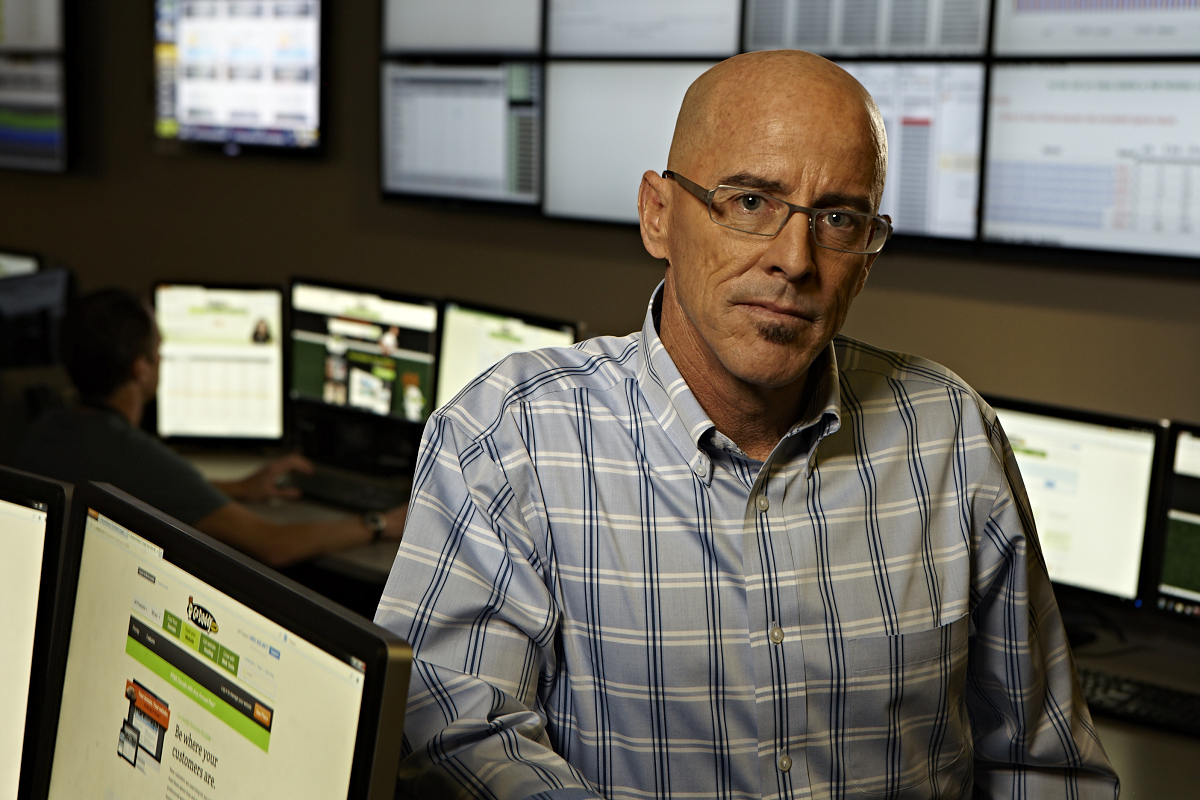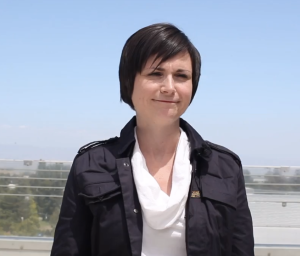 GoDaddy is growing up. With new leadership, new branding, and a new vision, the company stands poised to transform the way small businesses operate online and bring greater opportunities to millions of people around the world.
GoDaddy is growing up. With new leadership, new branding, and a new vision, the company stands poised to transform the way small businesses operate online and bring greater opportunities to millions of people around the world.
But it won’t be easy. Change, they say, must come from within.
GoDaddy is the world’s largest domain-name registrar and web-hosting provider. GoDaddy rakes in $1.3 billion in annual revenue and is growing fast. More than 55 million domain names are under GoDaddy’s management. My dad has one, and yours probably does too. The company claims to register, renew, or transfer more than one domain name every second of every day, and it is larger than the next eight closest registrar competitors combined. Eleven million customers around the world use some of GoDaddy’s 40 product offerings to set up websites and online businesses.
Despite those astonishing numbers, most of us know GoDaddy not for its business metrics but for its provocative advertising campaigns, mostly featuring beautiful women in tight T-shirts.
But all that is about to change.
Overlooked and underrated
“GoDaddy is a pretty unknown quantity in the tech community,” said its new chief executive, Blake Irving, in an interview with VentureBeat. “Very few people actually know what it is, or they think it is only domains. They certainly don’t see the potential.
“But I see a very clear path of how to make GoDaddy the most valued, largest platform for small businesses in the world. It is quite clear that no one is doing it right yet.”
Irving assumed leadership of GoDaddy earlier this year and quickly made ripples by hiring executives away from big-name companies like Microsoft, eBay, Google, and Yahoo.
Irving’s previous role was as Yahoo’s chief product officer; he left shortly after the arrival of new Yahoo CEO Marissa Mayer. Before that, he served as a professor at Pepperdine University and as corporate vice president of the Windows Live platform at Microsoft for eight years. A self-described “product guy,” Irving arrived at GoDaddy ready to transform the company into a major, established, and understood force.
“What I like to do is make a significant change in the world for good,” he said. “I want to take something that doesn’t exist and help change people’s lives by helping people turn their ideas into businesses. From my perspective, GoDaddy is not yet a world-class platform, but that’s what we are building.”
Clearly, Irving is setting a very different tone than GoDaddy founder Bob Parsons, who wore a gigantic diamond earring, boasted about his elephant-hunting exploits, and clearly relished the part of his job that involved selecting the models for GoDaddy’s ads.
Irving is not changing the company’s branding overnight. But it’s clear he’d rather talk about business than the company’s advertising.
Irving’s goal is to make it as frictionless as possible for anyone to set up a business online. For a small monthly fee, people with no technical expertise can get a website up and running using GoDaddy’s suite of products and services. It offers simple drag-and-drop design tools, hundreds of themes and templates, integrations with popular business applications that support social media and customer engagement, and tools for making sites mobile-friendly. However, the tools are not as user-friendly or well-designed as they could be, and Irving has a massive undertaking ahead of him, both in terms of product development and marketing.
How is web hosting like kissing supermodels?
GoDaddy may have major name recognition due to attention-grabbing (and gag reflex-inducing) Super Bowl ads, but that recognition does not necessarily translate into brand awareness. There are plenty of people out there familiar with the ads who have no idea what GoDaddy does, not to mention that many find the ads tasteless, vulgar, and even offensive.
During the interview, Irving said this type of advertising is simultaneously effective and harmful. While model Bar Refaeli’s infamous kissing session with Jesse Heiman had everyone buzzing about GoDaddy, the conversation had nothing to do with its products. Interestingly, Irving pointed out that GoDaddy ran a second ad during the Super Bowl that involved less cleavage and was more on-brand. But no one remembers it.
On the one hand, this strategy garnered a ton of mainstream attention for a service as “unsexy” as  web hosting. Simple name recognition does actually have value for a company targeting nontechnical consumers. A person in a small Midwestern town who wants to start a pretzel business may vaguely remember that the company with the funny Super Bowl ad can help. On the other hand, a lot of the attention was negative and made GoDaddy seem juvenile and even sexist.
web hosting. Simple name recognition does actually have value for a company targeting nontechnical consumers. A person in a small Midwestern town who wants to start a pretzel business may vaguely remember that the company with the funny Super Bowl ad can help. On the other hand, a lot of the attention was negative and made GoDaddy seem juvenile and even sexist.
Irving acknowledged that GoDaddy’s negative reputation was on obstacle to recruiting, until he shared his new vision with the people he wanted behind him.
“There are not a whole lot of companies where you can do something fundamentally world-changing,” he said. “When I look around at what tech companies have done something this big, who are willing to take on things that are that important, it is the big guys like Google and Microsoft. But you can be a cog in a company that has already made its mark in a significant way, or you can come to a company that is poised to do that, and be the reason that happened. That’s why people are coming to GoDaddy.”
When I questioned him on marketing, Irving said the new strategy will be focused on conveying GoDaddy’s value proposition in a way that is on-brand but still edgy and fun. The priority is no longer shameless attention-grabbing because with over 50 percent of the market share in the U.S., “its not about market share anymore.”
High-powered recruiting
Since taking on the role of CEO, Irving has managed to lure executives away from elite companies in a competitive market — based primarily on the dream of what GoDaddy could be. Impressive hires include James Carroll, who previously served as Yahoo’s senior vice president of the consumer and global platform group; and Arnold Blinn, who before becoming GoDaddy’s chief architect spent 16-and-a-half years at Microsoft.

Above: GoDaddy’s new chief technical officer, Elissa Murphy.
General manager of hosting and security Jeff King left his job as a senior director of at eBay to work for GoDaddy, as did Raj Mukherjee, who worked as a product manager for Google Apps and Google Drive before becoming Go Daddy’s vice president.
These people will all contribute to the next phase of GoDaddy’s development and story as well as its ongoing expansion. Along with them is Elissa Murphy, who made headlines at the beginning of April when she announced her departure as Yahoo’s VP of engineering for cloud services to become GoDaddy’s chief technical officer.
“I didn’t think I would leave Yahoo,” Murphy told VentureBeat. “But when something tugs at your gut, you have to take a second look. Blake came to me with an offer, and I said, ‘Huh?’ But he told me to pay closer attention. I had no idea how much of an opportunity this was. GoDaddy is this diamond in the desert, and you would never guess that it has the financials it does or the relationship with customers. I joined GoDaddy because I want to have an impact on the world.”
Murphy said she is motivated by three things — making a difference, a work environment that enables her to grow and learn, and serendipity. Before Irving reached out to her, Murphy helped a hairstylist friend of hers set up a business using GoDaddy. Her friend had hired a consultant to build her website, who was charging hundreds of dollars for basic work. Murphy was appalled, and using GoDaddy, she built her friend a fully functioning website in a matter of hours. This experience helped her see the potential for GoDaddy to become a major force supporting small business owners around the world.
“You don’t want technology to be a barrier to anyone’s success,” he said. “But how do you enable someone who may not be tech savvy to come online and make a business for themselves? That to me is the American dream — the ability to take an idea and make it a reality.”
When asked about GoDaddy’s less-than-progressive marketing tactics, Murphy said she had not seen the ads but is more concerned with is going on now and in the future than what happened in the past. She worked with Irving before when they were both at Yahoo, and said she has seen him to “amazing things” and is one of the rare people capable of innovating at scale.
Empowerment through Internet marketing
As both Murphy and Irving reminded me, the entire world is coming online, and the Internet creates business opportunities for anyone from Silicon Valley entrepreneurs to women in small Mexican villages to my dad, who runs his own law practice. With this growth comes tremendous opportunities to empower people on all ends of the technical and socioeconomic spectrum to forge their own path and support themselves and their families.
GoDaddy has already made significant headway on this front, as its metrics and financials reveal. The roadmap involves efforts to make the existing products even more easy to use, and to continue adding in new features and services. There will also be a greater focus on mobile technology, which is seeing rapid adoption around the world — particularly in emerging markets like sub-Saharan Africa, where people have greater access to smart phones than libraries.
To help realize this vision, Irving opened up new offices in Seattle and Mountain View, Calif., and is exploring new advertising campaigns that maintain an edge, but are more in line with the evolution of the company.
GoDaddy is maturing into a new phase and shedding the garb of its adolescent days for a more mature look. With a new vision, impressive team, and strong position in the market, GoDaddy may be able to realize its full potential.
Top photo credit: GoDaddy
VentureBeat's mission is to be a digital town square for technical decision-makers to gain knowledge about transformative enterprise technology and transact. Learn More
